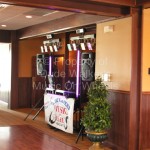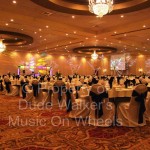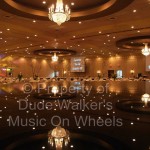Dude Walker’s stage-life
Local DJ Tunes Into His Audience, Connects Music to Emotion
Q&A
by Tracy Frank
tfrank@forumcomm.com
Dude Walker’s Music On Wheels has been heard everywhere from school dances to weddings to large-scale events for the past 20 years.
Walker has been a local disc jockey since 1984, which has included working for Fargo – Moorhead radio stations Q98 and Y94.
Though he started his company in 1987 with a couple of employees and a turntable, today Walker has six employees, having recently scaled back from 16.
He has also expanded the business to include a sizeable club-like system. Though he DJs for large events, Walker said weddings are still his passion.
“When you can find that emotional moment, when you can get a dad to cry like a schoolgirl on the dance floor…honestly there’s nothing better,” Walker said. “We go through life being so desensitized that if you can find that connection, it’s worth it.”
What made you decide to go out on your own?
There is such a live aspect to what we do, just interacting with people. You can site in a box and read cue-cards, but you’re missing a live element. Your only connection to the outside world is a phone line.
What is your biggest challenge?
When you’re playing music, you sink or swim and you go through this job review every time you press play. That’s the most pressure of what we do because if you play the wrong song at the wrong time, it will clear the dance floor and everybody knows who cleared the dance floor. You’re always trying to read the crowd. That’s probably the biggest challenge. There’s a gut instinct to music but there’s also a continuing education.
How do you learn to read the crowd?
Psychology and sociology at college are probably the best classes I ever took. There are social dynamics that take place. Today you have such complicated dynamics compared to 20, 30years ago. You have two sets of parents, sometimes three. The father-daughter dance doesn’t take place because then she’s playing favorites between step-dads. That dynamic itself becomes so complex that you’re watching these personal conflicts, family wars play out before you. You’re walking a mine-field. They’re more that willing to blame you if something goes bad. We’ve had people die at a dance; we’ve had people break out knives and go into a fight; we’ve had storkes. There are so many preparations a person could take. One of the things we’re looking at now is CPR training for all of our DJs.
What makes a good DJ?
You have to have a good heart. There’s really nobody on out staff that doesn’t have a good heart. We all want to do a good job for our clientele. It comes down to finding that essence. That’s the hardest thing to put into print is the essence it takes to be a DJ. Everybody knows how to play music. Everybody can go through the motions of being a DJ, but finding that connection – it is about the connection.
How do you train your DJs?
Our training is really, really hard. The reason we scaled back for the last two years is that most people can’t make the training program. We give a test… It’s a music qualification test. We quantify what you know. Then we do music research. I know we’ve got a good DJ when they’re doing research and they actually go over to the computer and start listening to the songs that they’re not familiar with.
How has the equipment changed from when you started to where you are now?
One-hundred percent turntable to 100 percent non-turntable. We ran some cassettes , but it was largely turntables. This was a six-foot-long coffin, that’s what we called it. It was six feet long, teo feet deep and just wide enough to go through a door. You had your mixer and everything loaded in there. You’d carry milk crates full of albums. Now there are CDs. There are MP3 decks. There are computer software systems.
Dude: ‘Chicken Dance’ among crowd-pleasers

Dude Walker
How many songs do you usually play?
It’s amazing becasue we now we can carry instead of 300 of 400 songs, 30,000-40,000 songs. Of course now, with those demands, comes a whole new expectation because now a request is no longer a request, it’s a demand. Trying to help people understand that maybe their song is a good song to listen to, but it might not be a good flow for the dance floor, that sometimes is just political suicide. Video. That’s probably the new realm for people right now. It’s a good and bad thing because it immobilizes a dance floor because they’re just staring. But it’s also intriguing to see the video.
There are really 100 songs that get used on a regular basis, 200 that are on an occasional, like a yearly basis. Post-1998, there’s only [been] 4,000 different songs [played] in all the dance’s we’ve done. We really know what works because if people turn up their nose at it, if they’re not tapping their feet, they’re not getting into it. There are just a lot of songs that don’t make the grade.
Are your surprised by any songs that do make the grade?
Sir Mix-a-lot shouldn’t still be around. “Baby Got Back.” “YMCA.” Nobody ever asks for “YMCA” at a radio station, But it’s at every dance. The “Chicken Dance.” We’ve got a twist to the “Chicken Dance.” I made a heavy metal chicken dance. We ended up putting the back beat of the Nine Inch Nails behind it because there are people who turn up their nose at the chicken dance. I call it “Closer in Da Coop.”
How did you get into DJing?
I was well on my way before I even got to college. I played nine different instruments, came from a small town. I was the guy with a boom-box taken away many time from the principal. I was just into music, I installed stereos. If somebody needed their album converted to a cassette, I’d help them out. I’ve always had this desire. In 1973, when I was 7 or 8, I was well on my way. I was the guy with the music.
Readers can reach Forum Reporter Tracy Frank at (701)241-5526
Cited Source:
Frank, Tracy. “Dude Walker’s Stage Life.”
Fargo Forum 12 November 2007, Business: C1. Print.








![Twitter@Dude_Walker [Follow Button] Dude Walker Twitter Follow Button](https://dudewalker.org/wp-content/uploads/2010/12/dudewalker-TwitterButton-200x32.png)